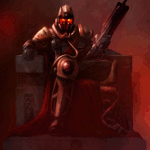|
Cythereal posted:I think that mostly comes down to Britain being paranoid about anyone who they thought might conceivably become a threat to the supremacy of the British Empire. That mentality was behind much of the British involvement in the War of 1812, for one. Britain seems to have consistently regarded "Our empire's prosperity shouldn't exist at the sufferance of the Royal Navy" as an existential threat to their own success. The thing to remember is that, at the time, the British perspective is very different from the continental perspective in some very important ways. The big one here is that Britain itself had not been invaded by an enemy army in a very long time. Armies had marched all over the continent within living memory, but England hadn't faced even a credible threat of potential invasion since the days of Napoleon. Unlike Germany, which faced the challenge of being surrounded by potentially hostile powers pretty much from day one, the British had no rival capable of threatening the homeland and intended to ensure that it stayed that way. To continental powers like Germany, the Royal Navy was an unequalled mechanism of force projection which could cut off colonial empires and squeeze off trade and commerce at any time, but to the British the Royal Navy was Britain's sole defense, the one and only thing protecting glorious Albion from the villainous Huns. In British eyes, any fleet capable of smashing the Royal Navy was an existential threat to not only the Empire but to Britain itself, and was therefore absolutely intolerable. Germany in particular already had one of the mightiest armies in Europe; to pair that with a fleet capable of seizing naval supremacy from the Royal Navy was unthinkable. They would have been the undisputed, unchallengable rulers of Europe and Asia. Kaiser Wilhelm, naive as always, failed to consider the political consequences of wanting the strongest army in the world and the strongest navy in the world, and he never really tried to put himself in Britain's shoes and see the world from their perspective. There were no illusions about the purpose of the German fleet, either - Tirpitz and others were insistent that it was meant to challenge the British fleet, mostly because that was basically the only practical justification for building an expensive dreadnought fleet instead of a bunch of cruisers. To the British, though, that raised a simple question: "if the Germans want to be friends with us, why do they need a navy designed to beat ours?" Wilhelm II apparently thought that was such a stupid question that he didn't really realize the British were asking it, and it's that failure to comprehend that ultimately destroyed British-German relations in the lead up to WWI.
|
|
|
|

|
| # ? Apr 19, 2024 23:14 |
|
OfficialGBSCaliph posted:Lack of Catholics edit: wallenstein may have converted after he fell out a window, so that gained Europe one catholic HEY GUNS fucked around with this message at 16:06 on Jun 21, 2016 |
|
|
|
HEY GAL posted:throw all the protestants out the window and you'll have more catholics by percentage, problem solved Don't you throw the Catholics out the window so they come back with an army?
|
|
|
|
WoodrowSkillson posted:Pumaman infestation Nice.
|
|
|
|
Kemper Boyd posted:The Silver Bible was also thrown out the window when the old Swedish royal castle burned down, it hit a dude and almost killed him. If you're killed by someone throwing a Bible out the window, does that effect what happens when your sins come up for judgement?
|
|
|
|
I've always wondered - how do Pikemen actually fight using those big goddamn pikes? Do they just stand back and poke at people? It seems like with how large and unwieldy they are, you wouldn't be able to get a ton of force behind a thrust.
|
|
|
|
tokenbrownguy posted:Can anyone recommend a book about Russia at the turn of 20th century? I'm looking for something that can explain, in broad strokes, the circumstances leading up to/after the civil war. This was fun to read: https://www.amazon.co.uk/Peoples-Tragedy-Russian-Revolution-1891-1924/dp/071267327X e: whoops this tab had been open quite a while it turns out. aphid_licker fucked around with this message at 17:12 on Jun 21, 2016 |
|
|
|
SquadronROE posted:I've always wondered - how do Pikemen actually fight using those big goddamn pikes? Do they just stand back and poke at people? It seems like with how large and unwieldy they are, you wouldn't be able to get a ton of force behind a thrust. You really don't need a ton of force to kill a man.
|
|
|
|
david_a posted:I found out that Trotsky was basically who I thought Lenin was, and Lenin was pretty much just an rear end. This also applies to working with Trotskyist and Leninist groups in the British left wing today, usually staffed by guys in their 60-80s. The Trotskyists are pretty much what you expect communists to be, and the Leninists are insufferable. Death to all factionalists, everyone come join my pacifist inclined entryist Labour faction though it's good and chill.
|
|
|
lenoon posted:This also applies to working with Trotskyist and Leninist groups in the British left wing today, usually staffed by guys in their 60-80s. The Trotskyists are pretty much what you expect communists to be, and the Leninists are insufferable. So Momentum?
|
|
|
|
|
HEY GAL posted:do you want my dudes to be airborne Fighting pike-men from the sky... (someone else take over from here, I don't know enough of this pre-Rifle Age stuff) (Well-dressed men, something ending with a rhyme for sky?) HEY GAL posted:you become useless and bullshit. an 18 foot long spear only works as a weapon when there's more than one dude with one and everyone knows what's going on so you can cover one another and the shot So, just a jump to the left...
|
|
|
SeanBeansShako posted:Actually, he adapted and improved the corp structure and continued the tradition of refining the French army from Carnot who did some pretty cool things himself. Napoleon is kind of a brand at this point.
|
|
|
|
|
Zamboni Apocalypse posted:Fighting pike-men Fighting pikemen from the sky Unpaid men who poke and die Men who mean just what they say These brave men will steal you hay JcDent fucked around with this message at 18:11 on Jun 21, 2016 |
|
|
|
lenoon posted:This also applies to working with Trotskyist and Leninist groups in the British left wing today, usually staffed by guys in their 60-80s. The Trotskyists are pretty much what you expect communists to be, and the Leninists are insufferable. https://www.youtube.com/watch?v=NrDVsprWRCQ&t=40s
|
|
|
|
JcDent posted:Fighting pikemen from the sky We'll take you all from worst to best A hundred we'll recruit today But all but three will sneak away
|
|
|
Disinterested posted:Napoleon is kind of a brand at this point. He was a brand at the height of his power. His symbol? the honey bee. loving genius.
|
|
|
|
|
HEY GAL posted:Rusted breastplate on his chest
|
|
|
|
nothing to seehere posted:So Momentum? Nah I honestly think they're a weird bunch. Corbyn himself is fine because he came to my exhibition, and a talk I did in 2014, any politician willing to listen to me ramble on about Baker and Comrades is all good with me. 
|
|
|
|
Cyrano4747 posted:For a great example of this look at Germany's dick waving about colonies etc in the early years of the 20th century. The first Moroccan Crisis did a wonderful job of making Germany a major national security concern for France for exactly zero gain (even the theoretical gain was limited - Morocco isn't exactly a mouth watering prize), cementing the anglo-french entante, and nearly kicking off WW1 a decade early for good measure. Bismarck was against taking Austrian land and also against taking Alsace-Lorraine since he understood it would be huge issue but he got overruled.
|
|
|
|
100 Years Ago Our correspondent Malcolm White is due to go over the top on the first day of the Somme. Today we examine what he'll be expected to do when he attacks; and also what, if anything, his corps commander (one General Hunter-Weston) might have learned from Gallipoli. Henri Desagneaux's suffering continues at Verdun; Louis Barthas proves that even he can annoy me under the right circumstances; and Oskar Teichman is doing a lot of desert travelling up towards a forward outpost.
|
|
|
|
lenoon posted:This also applies to working with Trotskyist and Leninist groups in the British left wing today, usually staffed by guys in their 60-80s. The Trotskyists are pretty much what you expect communists to be, and the Leninists are insufferable. In the brexit thread a apparently real communist was posting that they were all for brexit because it would hasten the fall of all capitalism, and states, which, I dunno, are inherently bad and definitely not what a people's state is I am highly amused by the fact that they only engage in politics when the long predicted revolution of the proletariat happens, until then they basically do nothing but complain that the revolution hasn't happened yet
|
|
|
|
Nebakenezzer posted:In the brexit thread a apparently real communist was posting that they were all for brexit because it would hasten the fall of all capitalism, and states, which, I dunno, are inherently bad and definitely not what a people's state is Accelerationism is the worst. I've seen the same sort of argument used for not voting for Clinton over Trump. Trin Tragula posted:100 Years Ago Uh oh!
|
|
|
|
SeanBeansShako posted:Napoleon was indeed a great adapter, micro manager and not a crazy Jacobin or slothful Bourbon who brought stability, financial growth and success to France which is why he was and still is sort of beloved. Except that his wars literally ruined France financially and economically. The country was so ravaged by war, conscription, and occupation that by the end of it it was utterly in shambles. And there was a lot to ravage, as France was a demographic powerhouse: between the two first censuses of the Napoleonic era - 1801 and 1806 - it gained nearly two million inhabitants, but then only 710 thousand over the next fifteen years, despite a record number of marriages in 18131. After Napoleon was exiled, the country was half a billion livres in debt (and claimed to be 1,3 billion in the hole) and had to pay 150 million a year to cover the costs suffered by the occupying powers (whose troops kept plundering the countryside, further reducing tax income) and 700 million in indemnities. One of the important functions of the White Terror was to restore fluency to the state by intimidating reluctant taxpayers. The merchants had learned to smuggle colonial goods into the country, greatly hurting tariffs (not that they were in good shape after trade with Britain stopped) and license fees. The harvests during the late Napoleonic and early Restoration periods were bad, and only made worse by a burning lack of farm hands. The internal road network had deteriorated greatly since the Revolution suspended the corvée (mandatory unpaid labour on public projects). Infrastructure projects under the Empire were seasonal (bad winter weather tended to pretty much undo everything that was done in the summer) and mostly worked on by prisoners of war, so almost none were completed (and those few that were stood in the territory lost in 1814). Foreign trade was dead due to the British blockade. Now, the reason why the Hundred Days happened is that the Bourbons utterly mismanaged the army, mostly. There was little Bonapartist sentiment amongst the peasantry, who did not enjoy being taxed to hell and conscripted (in fact, when the king announced conscription was coming back a few years after The Hundred Days, the Morbihan department authorities immediately forcibly disarmed all the former soldiers for fear of an uprising). Napoleon was also hated by the bourgeois, who resented him for his monarchism, which was only made worse after he essentially reinstated hereditary peerage senators after coming back to power. The nobility was also 100% behind the Bourbons, because why wouldn't they be? The country was completely handed over back to them, they were the majority of the parliament pretty much until the July Revolution, the nobility requirement for office ran very deep. The army, though? "Hello, Marshal! Had a good time fighting for France over the past fifteen years or so? Don't care, anyway! Here's your new boss, my "By the way, we cut your funding by a third. Ciao!" And yet in spite of all that - the horrible menace of the return to the Ancien Régime, the awful contempt for Napoleonic veterans, the hardships of the occupation - even many of the veterans did not join their Emperor. In fact, some even joined royalist uprisings. There were marshals who decided that they were better off staying home than coming to help Napoleon. And there were soldiers who declared for him, but refused to leave their home regions, forming local militias to protect the borders. In all, the Napoleonic legend wasn't actually born until decades later... at least in France. I'm fairly sure that it came into force in Poland sooner than in France. We were very early adopters of that trend. 1. It was actually seen as a great way to avoid conscription. Tevery Best fucked around with this message at 21:29 on Jun 21, 2016 |
|
|
|
Also, Napoleon reimposed slavery in the French Empire after the Republic had abolished it, so gently caress him forever, frankly.
|
|
|
|
Never said he was good at keeping his money or power. For the first half of his reign his conquests actually grew the French populations faith in the bank of France and he looted the poo poo out of fallen foes coffers. Which was then pissed away in more conflict and attempting the continental system despite not even maintaining the thing properly. Don't work with dudes called Talleyrand kids or step on the toes of your secret police chief. It will come back to bite you in the rear end! Empress Theonora posted:Also, Napoleon reimposed slavery in the French Empire after the Republic had abolished it, so gently caress him forever, frankly. Dude loved stability. He was good at keeping people who had been burned by the revolution in power content, that included such things as bringing back slavery and a few other unpopular taxes and laws. The man himself didn't have a hard on for the system of slavery. SeanBeansShako fucked around with this message at 20:53 on Jun 21, 2016 |
|
|
|
|
Empress Theonora posted:Accelerationism is the worst. I've seen the same sort of argument used for not voting for Clinton over Trump. I've heard it used by British Marxists in the 1980s as to why Thatcher's election was a good thing; because obviously such a right-wing figure would really educate the working classes as to why they should revolt I've heard the exact same argument given by the KKK as to why the election of a black man to the presidency is obviously a good thing for them, because now everybody will finally see real evidence of racial inferiority in action It's the argument of people who live in a fantasy world Ahem, Milhist: reading about Hunter-Weston fiddling makes me think a problem in WW1 attacks is everybody with the rank felt it necessary to have a go with their own innovations getting into the plan. Detonating that mine early is about the stupidest thing you could do in the context of a surprise attack, but I guess Hunter-Weston thought he'd just be following orders if he didn't inject his own ideas into the process
|
|
|
|
For you clowns who want game of thrones analysis heres thoughts from a real medieval military historian https://mic.com/articles/146615/the-battle-of-the-bastards-proved-one-bastard-wasn-t-as-clever-as-he-thought#.DYh0hbfOU This isn't about historicity aa much as tactical analysis
|
|
|
|
Napoleon was fine as a military commander, but as emperor, he ran into a lot of problems to which there was no good military solution. He didn't get to be in charge of France by being a diplomat or managing investments. The whole French Revolution was started by the French government being broke, and plundering church property can only get you so far when you've dug yourself into some big long massive wars. At least Napoleon's administration had comparatively less mass executions. Tevery Best posted:Except that his wars literally ruined France financially and economically. The country was so ravaged by war, conscription, and occupation that by the end of it it was utterly in shambles. And there was a lot to ravage, as France was a demographic powerhouse: between the two first censuses of the Napoleonic era - 1801 and 1806 - it gained nearly two million inhabitants, but then only 710 thousand over the next fifteen years, despite a record number of marriages in 18131. Wasn't a big part of the plundering church property the forcible marriage of nuns and priests before they got sent to the mass executions? Although I guess maybe the years don't line up for that.
|
|
|
SlothfulCobra posted:Napoleon was fine as a military commander, but as emperor, he ran into a lot of problems to which there was no good military solution. He didn't get to be in charge of France by being a diplomat or managing investments. The whole French Revolution was started by the French government being broke, and plundering church property can only get you so far when you've dug yourself into some big long massive wars. Oh he got into the whole war crime thing a little bit himself. During his Italian campaign, one or two Italian villages were razed as example. Then there was the siege of Jaffa. Though that one was inevitable when the Ottoman representive send Napoleon's diplomats head back to him. EDIT: Basically, one of the theories over Napoleon's successes and the eventual fall from grace with his career was basically a huge shift in personal relationships with people and politics. During the early days he and his family sort of relied on each other and he was steered pretty well with some close political allies and marshals. As time passed, he slowly fell out with his family or they got too greedy and fell out with him, his close friends and marshals either died or retired and his political allies eventually turned and hosed him for better gain. Without his best marshals, the 'chill out bro' advice from his brothers or 'stay the course pal!' encouragement of his politcal bedfellows Napoleon like any man could gently caress up and make some pretty big mistakes. SeanBeansShako fucked around with this message at 21:28 on Jun 21, 2016 |
|
|
|
|
SlothfulCobra posted:Wasn't a big part of the plundering church property the forcible marriage of nuns and priests before they got sent to the mass executions? Although I guess maybe the years don't line up for that. Yeah, I don't think that's it. The 1813 marriages were mostly related to avoiding conscription.
|
|
|
|
Thanks so much for the Napoleon chat. I enjoy hearing the different perspectives on him as a politician, general, and governor. It was mentioned that he substantially improved the artillery corps. How did artillery function in France pre-napoleon, and how did he change it? (as a mathematician, I really like artillery. It's such a beautifully abstract way to, uh, murder.  ) )
|
|
|
|
|
From what I know it was mostly about tactical use. Before Napoleon, the general consensus was to deploy it more or less evenly everywhere and hammer at the enemy until they break somewhere or decide they must attack now, lest they break, or until you notice a part of the line was affected disproportionately and can be attacked now. Napoleon decided instead that artillery wins battles, not supports the infantry as they do. So he pooled nearly all his guns into a single battery, set it up somewhere cozy and could support or hammer any place within range with overwhelming firepower, thus being able to dictate where and when exactly the enemy ought to be weak and ripe for the butchering and, by consequence, to at least partially plan around it.
|
|
|
|
Can anyone talk about - as it's called here - "Canada's Hundred Days"  ? The last phase of fighting on the Western Front in the First World War. As I understand it, the Germans tired themselves out, the Americans entered the war, and the Germans fell to pieces. Was this campaign the success it's portrayed as, since German defeat, in hindsight was inevitable? Was the fighting much different from Vimy or Passchendaele? ? The last phase of fighting on the Western Front in the First World War. As I understand it, the Germans tired themselves out, the Americans entered the war, and the Germans fell to pieces. Was this campaign the success it's portrayed as, since German defeat, in hindsight was inevitable? Was the fighting much different from Vimy or Passchendaele?
|
|
|
|
SquadronROE posted:I've always wondered - how do Pikemen actually fight using those big goddamn pikes? Do they just stand back and poke at people? It seems like with how large and unwieldy they are, you wouldn't be able to get a ton of force behind a thrust. You're still using your arms to supply the force. The pike is longer and more massive than a spear, for example, so it is very much more awkward to position the point and it has more inertia so it takes more to start and stop it's motion, but the difference in the force you can generate isn't huge. Arguably, the sheer mass of the pike makes for a more lethal penetration because of the momentum involved. You're also, essentially, trying to shove a knife into a person's body--it just happens to be at the end of a 20' pole instead of your 25" arm--which doesn't require very much force at all because the point does all the work of penetrating.
|
|
|
|
Frosted Flake posted:Can anyone talk about - as it's called here - "Canada's Hundred Days" The timeline more reads the Americans entered the war, which caused the Germans to tire themselves out. They launched the Spring Offensives almost as a direct response to realising they had no time left. The SO did essentially destroy the best parts of the German army though, cos the stormtroopers were hand picked to be the best and most motivated etc, so when they got demolished (because it's WW1) then Germany was pretty much out of quality manpower. Despite this the Hundred Days is still really impressive in terms of how the Allies managed to keep momentum going despite the fact that WW1 combat is obviously very slow. In my opinion it's one of the great examples of "Operational Art", as the repeated blows up and down the line by the French, Americans and British/Canadian/Anzac/etc forces pinned the Germans and essentially changed one big attack along a wide front into dozens of very successful localised attacks. So even though the German defeat was probably inevitable, the Hundred Days was pretty much the best possible way to carry out the coup de grace. The best example is probably the breaking of the Hindenburg line (the greatest defensive line ever created to this point) at every point along a 19 mile front in less than a week. From a fighting perspective, yeah it was pretty different because it moved into what's known as "semi-open" warfare. So basically a hurricane bombardment, followed by a tank-led breakthrough assault, capture a couple of miles of territory (or as far as you could get before comms totally poo poo the bed) and then dig in. The whole process only took a couple of days usually, unlike the weeks-long campaigns of previous years. A couple of weeks later the offensives would get back to the same area of the line and the Allies would do it again. It's more like Cambrai than Vimy or Passchendaele, but they actually had a follow up plan for when they broke through. Also it should probably be noted that casualty rates were WAY higher during the Hundred Days (and 1914) than in the rest of the war. They dug those trenches for a reason basically.
|
|
|
|
re: pikes in the Game of Thrones battle (HEY GAL trigger warning), they looked to be about twice a man's height with a large butt or counterweight on one end. The Bolton formation was really tight, guys with only a huge shield in front and a row of the pikes behind poking through the small gaps between shields. The pikemen are wielding their pikes at waist height instead of shoulder. I'm not sure why it makes sense to have multiple rows of dudes armed only with shields, the back row of shield guys are basically just standing around the whole fight.
|
|
|
|
Frosted Flake posted:Can anyone talk about - as it's called here - "Canada's Hundred Days" I absolutely hate the phrase "the Hundred Days", for the same reason that I hate "the Race to the Sea"; it gives a totally misleading impression of what was going on. So that's the first point to make. The name implies a giant countdown clock from a Hollywood movie, inexorably counting down to the end of the war; but the final offensive wasn't supposed to be the final offensive. By 1918 everyone in charge had finally got it into their heads that the Germans probably weren't going to run out of men any time soon, so the second half of 1918 was basically supposed to be "Let us have another go at refining these ideas for getting out of trench warfare, kill a lot of Germans in the process, gain as much ground as we can to make the next bit as easy as possible, and then in 1919 we will load the American army into a fleet of Renault FTs, point them in the general direction of Berlin, and let them go." Two weeks before the start of the offensive, the War Office issued a paper confidently declaring that the Western Front would remain deadlocked until mid-1919, while talking up the excellent prospects on other fronts. Even a couple of days before the Germans opened negotiations for an armistice in October, Haig still thought that it was as likely as not that the war would continue until at least spring 1919. The war then ended with no Entente soldier closer than about 70 miles to today's German border; all the way to the signing of the armistice, plans were being laid for further battles and fresh attacks in case negotiations broke down. The fighting was absolutely and totally different from the 1917 battles, which might have but never quite escaped trench warfare due to a number of extremely depressing reasons. The final months of the war are an extremely tricky subject for anyone brought up on popular images of the First World War as machine guns, barbed wire, and Haig's famously immobile drinks cabinet. Here they finally manage to perfect something called "All Arms Battle", from where you can draw direct lines to modern combined arms theory. The trench lines are shattered in a couple of days, and we're back to semi-mobile warfare. Someone's finally worked out how to overcome the "the General doesn't really know what's going on" problem. And then the bit that popular culture has the biggest problem with; the two men in overall charge of the BEF's part of what turned out to be a war-winning offensive were Haig and Rawlinson, the men who two years and one month earlier planned and presided over the Somme. This does not fit the narrative; they're supposed to be dim-witted butchers, not far-sighted victors, so people tend to just not think about it. Sure, there were a lot of new ideas washing round, and a hell of a lot of the innovation was coming from the ANZACs and the Canadian Corps (there's a reason I spent a lot of time recently talking about the Battle of Mont Sorrel), but someone else had to sign off on them. On the other hand the Canadians' importance to that final offensive is only slightly overestimated; they were right in at the sharp end of almost everything (along with those ANZACs) and the crossing of the Canal du Nord in particular is one of the few offensive actions on the Western Front that you can point at and go "this, this is loving excellent".
|
|
|
|
And didn't involve the world's biggest Pre-nuclear explosion?
|
|
|
|
That would be the detonation of the mines that began the Battle of Messines, which was in 1917.
|
|
|
|

|
| # ? Apr 19, 2024 23:14 |
|
What is semi-mobile warfare? Was it hasty scrapes and roadside ditches like 1914? Did horse cavalry finally get to the green fields beyond? e: both of the posts about this were awesome, by the way. Thank you.
|
|
|



































